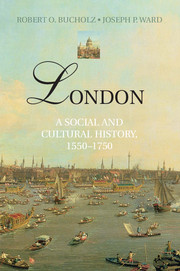Book contents
- Frontmatter
- Contents
- List of Illustrations and Maps
- List of Abbreviations and Conventions
- Acknowledgments
- Maps
- Introduction: London's Importance
- 1 London in 1550
- 2 The Socioeconomic Base
- 3 Royal and Civic London
- 4 Fine and Performed Arts
- 5 The Public Sphere and Popular Culture
- 6 The People on the Margins
- 7 Riot and Rebellion
- 8 Plague and Fire
- Conclusion: London in 1750
- Notes
- Further Reading
- Index
- Plate Section
6 - The People on the Margins
Published online by Cambridge University Press: 05 November 2012
- Frontmatter
- Contents
- List of Illustrations and Maps
- List of Abbreviations and Conventions
- Acknowledgments
- Maps
- Introduction: London's Importance
- 1 London in 1550
- 2 The Socioeconomic Base
- 3 Royal and Civic London
- 4 Fine and Performed Arts
- 5 The Public Sphere and Popular Culture
- 6 The People on the Margins
- 7 Riot and Rebellion
- 8 Plague and Fire
- Conclusion: London in 1750
- Notes
- Further Reading
- Index
- Plate Section
Summary
The challenges faced by metropolitan London's governors – the perennial concerns of cities everywhere, such as poverty, crime, crowd control, disease, fire, and the maintenance of order generally – became more complex as the population increased. These problems were probably as old as the city itself, but their growing scale stretched the existing governmental system to the breaking point. Among these challenges, poverty and crime became particular obsessions for Londoners, partly because they seemed to contemporaries to go hand in hand.
The Problem in Macrocosm: The London Poor in Aggregate
There are two ways to examine any great human problem: from the macroscopic point of view of statistics and policy, and from the microscopic, that is, its effect on individual people. As with most such problems, poverty engulfed people in a situation created by massive forces and long-term trends beyond their understanding, let alone their control. In the case of early modern English men and women, much depended on the demand for, and supply of, labor. For two centuries after the appearance in England of the Black Death in 1349, the resulting population shortage meant that agricultural labor was in relatively high demand, all the more so because the English cloth trade was usually vibrant. What we would today call “unemployment” seems to have been fairly minimal and manageable in the later Middle Ages.
- Type
- Chapter
- Information
- LondonA Social and Cultural History, 1550–1750, pp. 219 - 267Publisher: Cambridge University PressPrint publication year: 2012



